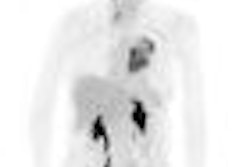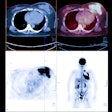Radioactive skin patches can safely and successfully treat basal cell carcinoma, a disease that is diagnosed in 1 million Americans each year, according to research presented at this week's SNM annual meeting in Toronto.
Although experimental, skin patch treatment could replace conventional surgery or radiotherapy treatments, both of which can leave permanent scarring. The sealed skin patch is custom-made to conform to the shape and size of the patient's skin cancer lesions, and contains radioactive phosphorus-32 that delivers beta radiation to the cancer site.
Phosporous-32 poses no external radiation hazards. When placed on the skin surface, its limited range prevents beta radiation from reaching bone or underlying blood vessels, according to researchers from the All India Institute of Medical Sciences in New Delhi.
Eight patients diagnosed with basal cell carcinoma but who did not have cancer cells in their underlying facial structures participated in the study. Patches were applied locally on the lesions for three consecutive days, with each session lasting three hours.
Three months after treatment, biopsies of all patients' skin cancer sites revealed no residual malignant cancer, according to Priyanka Gupta, a nuclear medical technologist who presented the study. The treatment resulted in minimal scarring and had few adverse effects. Routine blood and biochemical exams did not reveal any toxicity from the radioactive patches.
Related Reading
Occupational exposure to radiation raises skin cancer risk, July 12, 2005
Copyright © 2009 AuntMinnie.com




















